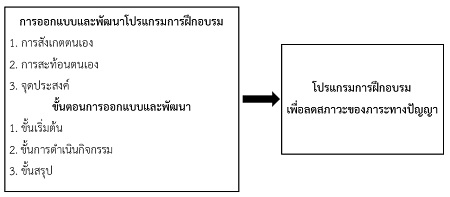การพัฒนาโปรแกรมการฝึกอบรมเพื่อลดสภาวะของภาระทางปัญญา
DOI:
https://doi.org/10.14456/nrru-rdi.2021.54คำสำคัญ:
สภาวะของภาระทางปัญญา, โปรแกรมการฝึกอบรมเพื่อลดสภาวะของภาระทางปัญญา, การพัฒนา โปรแกรมสภาวะของภาระทางปัญญาบทคัดย่อ
การวิจัยครั้งนี้มีวัตถุประสงค์เพื่อสร้างและพัฒนาโปรแกรมการฝึกอบรมเพื่อลดสภาวะของภาระทางปัญญา และการศึกษาผลการใช้โปรแกรม เป็นการศึกษาเอกสารเพื่อนำมาออกแบบโปรแกรม และนำไปใช้กับกลุ่มตัวอย่าง ที่เลือกด้วยวิธีเจาะจงเป็นนักศึกษามหาวิทยาลัยราชภัฏนครราชสีมา จำนวน 30 คน โดยใช้แบบวัดเพื่อประเมินสภาวะของภาระทางปัญญาที่มีความเหมาะสมและสอดคล้องในระดับมากเท่ากับ 4.47 การเก็บรวบรวมข้อมูลด้วยการดำเนินกิจกรรมตามโปรแกรมที่พัฒนาขึ้น และสถิติที่ใช้ในการวิเคราะห์ข้อมูล ได้แก่ ค่าเฉลี่ย ส่วนเบี่ยงเบนมาตรฐาน และการวิเคราะห์ความแปรปรวนทางเดียวแบบวัดซ้ำ
ผลการวิจัยพบว่า 1) โปรแกรมการฝึกอบรมเพื่อลดสภาวะของภาระทางปัญญามีจำนวน 14 ครั้ง ประกอบด้วย 3 ขั้นตอน คือ ขั้นเริ่มต้น ขั้นดำเนินการ และขึ้นยุติการฝึกอบรม โดยโปรแกรมการฝึกอบรมเพื่อลดสภาวะของภาระทางปัญญาผ่านการประเมินและการตรวจสอบเนื้อหาจากผู้เชี่ยวชาญจำนวน 5 ท่าน พบว่าผลการประเมินมีความเหมาะสมอยู่ในระดับมาก และ 2) ผลการทดลองใช้โปรแกรม พบว่า นักศึกษาที่เข้าร่วมโปรแกรมการฝึกอบรม มีคะแนนสภาวะของภาระทางปัญญาหลังการทดลองต่ำกว่าก่อนการทดลองอย่างมีนัยสำคัญทางสถิติที่ระดับ 0.01 โดยมีคะแนนเฉลี่ยก่อนการทดลองเท่ากับ 3.10 (SD=1.06) คะแนนเฉลี่ยหลังการทดลองเท่ากับ 2.15 (SD=0.53) และคะแนนการติดตามผลหลังการทดลอง 15 วัน เท่ากับ 2.14 (SD=0.49) สำหรับการติดตามผล พบว่า มีการคงอยู่ของการลดสภาวะของภาระอัตโนมัติ อย่างมีนัยสำคัญทางสถิติที่ระดับ 0.01
เอกสารอ้างอิง
Bandura, A. (1989). Social cognitive theory. In R. Vasta (Ed.), Annais of child development Vol. 6. Six theories of child development (pp. 1-60). Greenwich, CT : JAI Press.
Best, J. W., & Kahn, J. V. (2006). Research in education (10th.ed.). New Delhi : PHI Learning Private.
Boekaerts, M., & Cascallar, E. (2006). How far have we moved toward the integration of theory and practice in self-regulation?. Educational Psychology Review, 18(3), 199-210.
Buckley, R., & Caple, J. (2009). The theory and practice of training. Kogan Page Publishers.
Cronbach, L. J. (1990). Essentials of psychological testing (5th ed.). New York : Harper Collins.
Jinwan, W. (2011). Applied to Cognitive load with online learning design. Journal of Vocational and Technical of Education North Bangkok, 4(1), 19-24.
Juito, S. (2011). New Paradigm Human Capital Management. Bangkok : Sukhothai Thammathirat Unitversity Printing house. (In Thai)
Kalyuga, S. (2009). Managing Cognitive load in Adaptive Multimedia Learning (pp. 198-216). Hershey : Information Science Reference.
Labmala, S. (2012). Teaching by Cognitive load. Thailand Education Journal, 9(94), 29-34. (In Thai)
Maranges, H., Baumeister, R., & Schmeichel, B. (2016). Attention and willpower are not the same resource: Evidence that cognitive load and ego depletion operate by different processes. Tallahassee, FL: Florida State University. Under review.
Noe, R. A., & Kodwani, A. D. (2018). Employee Training and Development, 7e. McGraw-Hill Education.
Salas, E., Weaver, S. J., & Shuffler, M. L. (2012). Learning, training, and development in organizations. Oxford University Press.
Saraubon, K., & Piriyasurawong, P. (2014). Cognitive Load Reduction Media for Education in The Digital Age. Panyapiwat Journal digital age, 6(1), 198-211. (In Thai)
Smithikrai, C. (2013). Training of Personnel in the Organization (8th ed.). Bangkok : Chulalongkorn University. (In Thai)
Somrong, A. (2018). Psychology of Personnel Management (4th ed.). Bangkok : Ramkhamhaeng University. (In Thai)
Sri-saat, B. (2013). Statistical Methods for Research (5th ed.). Bangkok : Suwiriyasan. (In Thai)
Tindale, R. S., & Sheffey, S. (2002). Shared information, cognitive load, and group memory. Group Processes & Intergroup Relations, 5(1), 5-18.
Vasile, C., Marhan, A. M., Singer, F. M., & Stoicescu, D. (2011). Academic self-efficacy and cognitive load in students. Procedia-Social and Behavioral Sciences, 12, 478-482.
Wanichbuncha, K. (2016). Advanced Statistical Analysis with SPSS for Windows (11th ed.). Bangkok : Faculty of Commerce and Accountancy, Chulalongkorn University. (In Thai)





